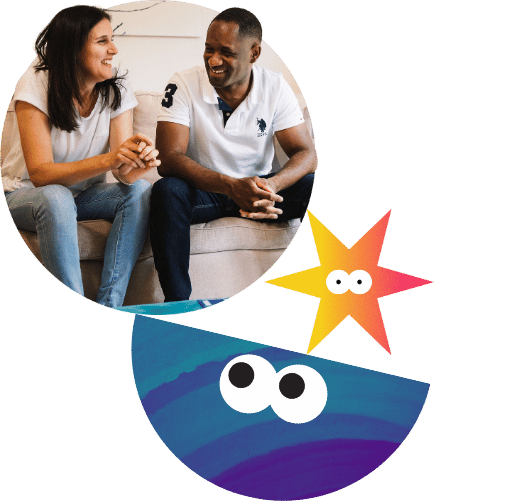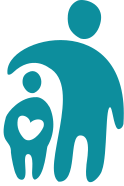Pathway for adults
Join our learning pathway for all adults: a journey of understanding emotional health to build nurturing, fulfilling relationships.
Pathway stages
Bitesize stages for daily steps towards emotional resilience and connected relationships.
1. Our feelings
1.1 Relationships
1.2 How do you currently feel about your relationship?
1.3 Understanding our feelings
1.4 How we know we’re happy
1.5 How we know we’re sad
1.6 How we know we’re tired
1.7 How we know we’re anxious
1.8 Feelings
2. Understanding how the other person is feeling
2.1 You and your partner’s feelings
2.2 Understanding when the other person feels happy
2.3 Understanding when the other person feels sad
2.4 Understanding when your partner feels tired
2.5 Understanding when your partner feels anxious
2.6 Your partner’s feelings
3. Reading behaviours
3.1 Reading behaviours
3.2 More examples
3.3 How our behaviour affects our partner
3.4 Your feelings make a difference
3.5 The challenge of reading behaviours
4. Responding
4.1 What’s coming up
4.2 Feeling worse
4.3 Feeling better
4.4 Containment: the basics
4.5 Containment: learning more
4.6 And more
4.7 What can happen when we have our own worries
4.8 Making space in your mind
5. Communication feelings
5.1 How feelings are communicated
5.2 The underlying emotions
5.3 Doing things differently
5.4 Another example of how feelings are communicated
5.5 Underlying emotions again
5.6 Trying to do things differently
5.7 Thinking about how we say things
5.8 Saying things differently
5.9 Developing a containing relationship
5.10 What you’ve learnt
6. The rhythm of interaction
6.1 Reflections and what’s coming up
6.2 The Dance of Reciprocity: The basics
6.3 Communication between adults
6.4 More about communication between adults
6.5 Understanding the Dance of Reciprocity
6.6 The 7 steps of the Dance
6.7 The Dance: Some observations
6.8 Self-regulation and the Dance
6.9 What you’ve learnt
6.10 Time to have a go!
7. Self regulation and anger
7.1 Feeding back on Time to have a go!
7.2 Key points from Time to have a go!
7.3 What’s coming up
7.4 What makes you feel angry?
7.5 What makes your partner angry?
7.6 Seeing anger in a different way
7.7 Why do you feel angry?
7.8 When can anger be helpful?
7.9 When is anger unhelpful?
7.10 What you’ve learnt this Module
7.11 Time to have a go!
8. Coping with anger
8.1 Rupture and repair
8.2 How we learn to manage our anger
8.3 Parent child interaction examples
8.4 Alternative approaches
8.5 How can you work with your partner?
8.6 Time to have a go!
8.7 What you’ve learnt in this Module
9. What we learned from our parents
9.1 What’s coming up
9.2 How did your parents deal with anger?
9.3 What do you think you learned from your parents?
9.4 Time to have a go!
9.5 What you’ve learned in this Module
10. Rupture and repair
10.1 Reflecting on the last Module
10.2 Feeding back on Time to have a go!
10.3 What’s coming up
10.4 How to recover when things go wrong: rupture and repair
10.5 Example of a rupture
10.6 Where did things go wrong?
10.7 How the situation could be improved: a repair
10.8 Repairing the situation
10.9 Repairing relationships
10.10 What happens after a disagreement
10.11 The importance of apologising
10.12 More about apologising
10.13 Some other observations
10.14 Time to have a go!
11. Looking forwards
11.1 Reflecting on the last Module
11.2 Feeding back on Time to have a go!
11.3 Some other people’s observations
11.4 Have you changed anything?
11.5 Doing things differently
11.6 Post-course questionnaire
11.7 Solihull Approach acknowledgements
11.8 The end of this course: continuing your journey
About this pathway
Relationships play a vital role in our emotional wellbeing. They influence how we feel about ourselves, how we relate to others and how we experience the world. While they can bring joy and connection, they can also be complex and sometimes challenging to navigate.
Understanding your relationships is a step-by-step guide to exploring your emotional wellbeing and the needs that shape your most important connections. It helps you reflect on how your own feelings and behaviours might affect or be affected by those of others
Follow short bitesize content to discover new ways to communicate, connect, and respond in your relationships.
Created by our clinical psychologists, psychotherapists and health practitioners, this pathway can support you to better understand your emotions, needs and communication style, for healthier relationships.
Along this pathway, you’ll explore:
- How to express and manage emotions
- Communication styles
- Emotional containment
- Resolving disagreement and managing frustration
- The impact of early experiences on adult relationships
- How to build healthier, more connected relationships
You may also find our resources to support parents to build stronger relationships useful to accompany this pathway. Explore our ‘Falling out and making up’ resources.
88% learners who completed the pathway said that they found it helpful
87% learners who completed the pathway said they would recommend it to friends and family
71% learners who completed the pathway said it helped reduce conflict in their relationship with their partner
“We have learnt to communicate better and take time to listen to each other instead of brushing each other’s feelings off as nothing.”
Learner from the pathway
“I’m glad that I have done this course to help me learn to control my anger and repair any rupture.”
Learner from the pathway
“This course has helped me deal with a lot of emotions in a good way.”
Learner from the pathway
“Good course, thank you. It was assuring to see that I am largely doing the right thing and helping me identify where things could have been improved.”
Learner from the pathway



